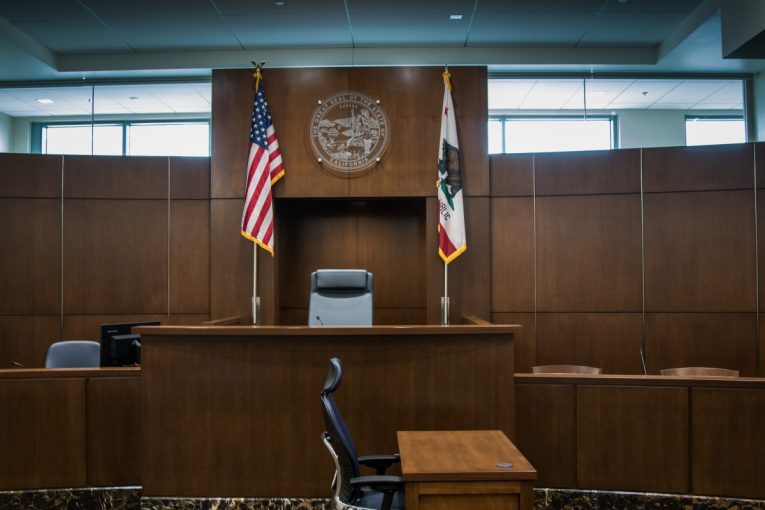

Assembled by Tiffany Devlin
The Davis Vanguard is an online news forum that provides coverage of criminal justice reform and courts throughout California and the nation. In 2006, the Davis Vanguard began to cover Davis and Yolo County groundbreaking, local news concerning government and policy issues affecting the city, schools, and county. In the past few years, the online news source has been able to expand to Sacramento and the surrounding regions.
Today, the team has grown, encompassing about 40 to 50 interns who monitor and report on live court proceedings in more than six different counties throughout California, from the State Capitol of Sacramento to the Greater San Francisco Bay Area, the Central Valley and Southern California.
Stories this week range from a female public defender engaging in altercations with defendants, to a defendant exclaiming to witnesses, “I’m going to kill you all” and “you motherfucker, you’re going to get shot”. The court calendars seemed to be packed with continuances, rescheduled court hearings, and DUI cases this week when interns covered courthouses in Sacramento, Yolo, and Fresno counties. They monitored more than 27 courtrooms, and dozens of cases in each court shift.
SACRAMENTO SUPERIOR COURT:
 Reporter Dylan Ferguson: On Nov. 9 in Sacramento Superior Court Dept. 62, Judge Michael Savage made a comment about how legislators decide to name statutes. The defendant’s prior conviction was in Deschute County, Oregon, where statutes are named as 6-digits. Judge Savage asked, “Do legislators sit around and think ‘oh this will be funny’? Because calling car theft a 6-digit number is hilarious.” Prosecutor Cody Winchester reminded him that California legislators name their statutes by 5 numbers and 1 letter. “Yeah, it is beyond ridiculous. This is California, but Deschutes County, that sounds like a reasonable place.”
Reporter Dylan Ferguson: On Nov. 9 in Sacramento Superior Court Dept. 62, Judge Michael Savage made a comment about how legislators decide to name statutes. The defendant’s prior conviction was in Deschute County, Oregon, where statutes are named as 6-digits. Judge Savage asked, “Do legislators sit around and think ‘oh this will be funny’? Because calling car theft a 6-digit number is hilarious.” Prosecutor Cody Winchester reminded him that California legislators name their statutes by 5 numbers and 1 letter. “Yeah, it is beyond ridiculous. This is California, but Deschutes County, that sounds like a reasonable place.”
 Reporter Özge Terzioğlu: On Nov. 9 in Sacramento Superior Court Dept. 60, defendant D’Andre Landbills was brought in for allegations of a misdemeanor battery on someone he was involved in a relationship with. When asked if he was okay with the Zoom appearance for court, the defendant seemed confused. When the bailiff clarified, the defendant agreed and said he normally wears glasses, so he couldn’t see the TV. Public Defender Alicia Hartley was concerned that the bail was too high for this charge, but the judge disagreed and said it was a bench warrant. His case was continued to November 16. The judge issued a $3,500 bench warrant for a no show defendant charged with petty theft. The same defendant, also charged with misdemeanor criminal threats and
Reporter Özge Terzioğlu: On Nov. 9 in Sacramento Superior Court Dept. 60, defendant D’Andre Landbills was brought in for allegations of a misdemeanor battery on someone he was involved in a relationship with. When asked if he was okay with the Zoom appearance for court, the defendant seemed confused. When the bailiff clarified, the defendant agreed and said he normally wears glasses, so he couldn’t see the TV. Public Defender Alicia Hartley was concerned that the bail was too high for this charge, but the judge disagreed and said it was a bench warrant. His case was continued to November 16. The judge issued a $3,500 bench warrant for a no show defendant charged with petty theft. The same defendant, also charged with misdemeanor criminal threats and 



Defendant Tina Rodriguez failed to appear today, a no bail bench warrant was issued by the judge. defendant Mark Townsley’s case was up for a motion for dismissal based on a lack of evidence, it was granted by the judge. Defendant Augusta Young failed to appear for a probation violation allegation, she was out of custody on her own recognizance. This was revoked and a bench warrant in the amount of $30,500 was issued. In between cases, the judge noted that “COVID numbers are going up, huh. It’s not likely that things are changing for the better.” The clerk said that it is frustrating how the news does not report on the numbers for the hospitals and which county is affected.


Reporter Hannah Skepner: On Nov. 10 in Sacramento Superior Court Dept. 27, there were two cases set for preliminary hearing. In the first case, defendant Robert Rice was being charged with the unlawful possession of a firearm and the unlawful carrying of a loaded firearm in a public place. Due to the offer by prosecutor Vanessa Washington, Rice pleaded no contest to those two counts while a Harvey waiver was entered for counts 3 and 5, stating that the court can refer back to the facts in those matters during sentencing. Count 4 was dismissed. The defendant waived time for sentencing, and will be back on Dec. 18. In the second case, defendant Tautiana McDaniels, represented by Dina Stone, was charged with one count of robbery, one count of assault with a deadly weapon, and one count of assault by means of force likely to create bodily injury. The offer by prosecutor Alexandra Sanders was a plea to a 180 day lid in prison (work project recommended), a stay away order from the victim, payment of any restitution fees, and 2 years of probation. However, the defendant did not want to accept the offer, as she believed she was not guilty for what she was being accused of. The People were going to call an officer witness, however there were some technical difficulties on his end causing the livestream to end.








Maroun once again stated that a condition of the bail set for the misdemeanor domestic violence case was to abstain from alcohol, and the present felony DUI now made it inappropriate to set bail at schedule. Judge Frawley agrees with the district attorney, and increases the criminal threats case bail to $200,000 and the felony DUI bail to $100,000.
Reporter Anna Judson: On Nov. 9 in Sacramento Superior Court Dept. 31, the court calendar was relatively light with only two cases being reviewed for preliminary hearings. In the first case, defendant Jerome Wells was arrested for stealing $130 from a neighbor in his apartment complex. There was no testimony or statement from the victim, and overall the preliminary hearing was very short. In the second case, defendant Semaj Myers’ case was not reviewed. It was pushed back a week for discovery. Lastly, Dept. 31 seemed to jump to the afternoon docket. The change was unexplained, but they ended up moving forward with a preliminary hearing for Cory Uriel Brooks. Not all the details were reviewed, and three officers provided testimony about how Mr. Brooks definitely committed the accused crime of breaking and entering.







Dept. 60 began with major difficulties as Judge Timothy Frawley continuously mentioned throughout the course of the morning. Zoom was not connecting for several defendants which resulted in several waived appearances. Audio was also an issue for Judge Frawley to hear the attorneys and the defendants. He feared not making it through the calendar as he eventually stated; however, they completed all cases early.
Defendant Gene Sargent was able to have his jail time suspended as rehabilitation was requested by Public Defender Patricia Campi instead. District Attorney Cpourtney Martin did not object the 

Defendant Ramon Waffer’s case ended in him having his probation time reduced to one year instead of three due to the amendment in Assembly Bill 1950 that allows the reduction for misdemeanors. He almost had to have another court date instead of being able to submit his plea due to the fact that Judge Frawley was trying to get through the case quickly in order to get to other ones. After his case was passed for a while, Public Defender Sameera Ali was able to come back with him so that he could plead no contest to false imprisonment.
In contrast to Waffer’s case, defendant Elijah Hill was not able to have his probation time reduced as Ali asked due to the fact that his case was not domestic violence. Assembly Bill 1950, involving limiting adult probation, does not apply to domestic violence cases.
Twenty four cases in total had to be continued into January for different reasons, mainly due to COVID and further investigation needed. There were a few cases that involved proof of completion for rehabilitation courses as well. Several bench warrants were issued that resulted in a total of over $40,000.
On Nov. 12 in Sacramento Superior Court Dept. 60, there were 23 rescheduled hearings and five failures to appear. Despite this, Judge Timothy Frawley did stay bench warrants for three defendants.
Defendant Ryan Boys was taken into custody for refusing to attend his medical examinations. He stated “I refuse to do a forced government examination with no cause so I’m turning myself in” as the bailiffs put him in handcuffs.
Defendant Bryan Caesar had a rehabilitation program deleted from his sentence and instead had his jail time increased from 75 days to 90 days due to the fact that he had not been attending. His public defender, Hendrick Crowell II, had asked that Caesar be enrolled in twelve anger management classes rather than serve another week in custody. District Attorney Anissa Galata stated, “I have no confidence that he would do the 12 sessions”. She emphasized that this was his fourth failure of the program. Judge Frawley agreed with Galata and ordered him to do ninety days in jail saying, “He just owes the time.”
Defendant Letrae Frazier had previously been in custody but is out on bail. She had attempted to run the victim over after an argument which left the victim fearful of her and a no contact order.
Despite there being a no contact order, the victim has been in contact with Frazier being that they share a child. Attorney Matthew Martinez asked that her bail be exonerated due to the fact that the victim changed his mind about being fearful of Frazier. “If he was fearful, I don’t think he would have left the child with her” Martinez stated. The victim had contacted both the victim advocate and Martinez indicating that he wanted all charges dropped and that the allegations were exaggerated; however, Judge Frawley did not exonerate the bond due to Frazier’s past criminal history and drug use.
Defendant Sean Neal was in custody and agreed to a Johnson waiver being that he had credits that would go over the limit of time he served for probation.
Reporter Julian Verdon: On Nov. 10 in Sacramento Superior Court Dept. 63, Julian observed a case where the prosecution dismissed the case of Daniel Freeman for a lack of sufficient evidence. Instead of immediately choosing to drop the case, Judge Patrick Marlette first chose to take the motion into consideration for 30 days. Damien Jovel, who was initially elated for his client getting his case thrown out, expressed some confusion as to why the Judge chose to make such a decision. He even said, “Come on, what?”
Judge Marlette then explained that the late Supreme Court Justice Ronald George got famous for a similar refusal to dismiss. He said back in the 1980s, the Los Angeles DA wanted to dismiss the Night Stalker’s case for lack of evidence and Justice George refused and assigned the case to the California Attorney General’s office. Although what Judge Marlette said is mostly true, Justice George actually got famous for refusing to dismiss the case against one of the Hillside Stranglers and not the Night Stalker.
Jovel then explained that his client had no record and was a former service member who enlisted after 9/11. Jovel said that this played a part in the DA’s, Ryan Roebuck, decision to drop the case to which Roebuck agreed that it played a part. He also noted that Roebuck was also a veteran and wished him a happy Veteran’s Day. Roebuck admitted that this was true. Judge Marlette then stated that he knew Chief Justice George and “that he was no Chief Justice George.” Therefore, Judge Marlette chose to grant the dismissal of Freeman.
Judge Marlette found that Marquis Walker was attempting to manipulate the court process by firing an attorney before the selected trial date. Walker had gone through two attorneys prior and was attempting to fire his third, Frederick Couzens, when the DA Kendra Havlick alleged he was manipulating the justice process. Ultimately Judge Marlette found Walker was indeed trying to manipulate the court system and ordered him to work with his current attorney. Marlette concluded that most likely knew how to delay his trial from his past experiences of being in and out of jail. Walker was charged with felony DUI because he had committed several in last 10 years which upgrades the charge to felony status. After discussing with his attorney for over an hour Walker chose to take the prosecution’s plea offer and spend four years in prison.










The defendants were in custody and physically present in court with their retained defense counsels, except for Jackson, with his defense attorney present via Zoom. The hearing was packed with prosecution witness testimony by Sacramento County Sheriff’s deputies and detectives that either responded to the crime scene or were involved in the investigation.
The three men are charged with murder and assault with a semi-automatic firearm, and all have pled not guilty. If found guilty, the defendants face 25 years to life for the murder charge, and up to 12 years for the weapons charge. It was not clear who the alleged shooter was.


“I’m telling you why you’re not getting out today,” the PD answered, handing him his papers. Before he could be escorted out by the bailiff, the defendant stops him, “Nah, I ain’t even f****** sitting here and asking this f****** lady.”He continues talking as the commissioner tells the bailiff that they need to move onto the next defendant. The public defender’s colleague then puts his hand up and yells at the defendant to stop. The mic in the courtroom is turned off, but you can see an exchange of words between the defendant and the female public defender before he leaves through the door.
This wasn’t the only altercation the female public defender was involved in. Later that day, she refused to bring in a defendant’s passport to the courthouse because the defendant’s attorney said he did not have to put on his mask because he “wasn’t a defendant.”
This second defendant was able to be released that day if the courthouse received his passport. There was a discussion about who would be the one to take the passport to the courthouse. The bailiff, after being asked, said he wasn’t sure he could take the responsibility. After the Commissioner suggested that the public defenders do it, that was when the attorney responded. “No, we’re not gonna take that responsibility either. Particularly after [the defendant’s private attorney] indicated to me that I didn’t need to say, ‘Please keep your mask on in court, sir’ because he is not a defendant.”
The commissioner, not catching it all, said, “I’m sorry?” “He can walk it over!” the public defender yelled.
Overall, Sacramento 62 heard 42 cases before taking a break and continuing with the night court. Almost all of the afternoon cases consisted of continuances.


“$1.5 million is ridiculous,” Templeton argued, “the bail schedule says it should be $85,000. My client has all kinds of family in the area that’s supporting him, and he also had a job that he was working at when this happened.” Deputy District Attorney Matthew Moore opposed this request, also bringing up Munoz’s involvement with the Oak Park Norteños gang.
“He ran so that he and another gang member, Ralph Munoz (co-conspirator), could discard their firearms,” said Moore, “Ralph Munoz is recently on parole for a gang violation, he’s a well-documented gang member. Jose Munoz has been validated as an Oak Park Norteño and has previously admitted his participating in that as well.”
“Again, this is about as short of a pursuit as you can have,” Templeton argued, “it barely meets the minimum qualifications arguably for a 2800.2… doubling it (bail) would be appropriate. Putting conditions such as. ‘Mr. Munoz can’t drive unless it’s to-and-from work or to not drive at all’, those are conditions that the court can consider, but putting bail anywhere close to where it’s at, to me, is ridiculous and unwarranted.” While Judge Michael Savage agreed that the $1.5 million was high, he did not agree with Templeton’s “ridiculous” comment.
“… at 20 years old, even with no record, that conduct puts the safety of the community at risk, and certainly puts the safety of peace officers at risk for anybody who would need to detain him, should he make bail.” Judge Savage concluded.
Despite Judge Savage’s dissenting opinion, Templeton quickly corrected him in regards to Munoz’s alleged conduct, saying that he was the alleged driver in the incident and that Moore had no position to say that Munoz fired the weapon.
“Okay, well even so,” Judge Savage says while laughing, “having a car pull up in front of a house and discharge a weapon, whether you be the driver or the shooter, that’s some of the most outrageous, violent, dangerous conduct that people can be involved with.” Judge Savage lowered his $1.5 million bail to $500,000. Templeton stated that this case is a part of a big un-joined co-defendant matter, where all parties agreed to continue on December 10 for further proceedings.
YOLO SUPERIOR COURT:







Again, DDA Johnson was confused as to why the defendant was in court because there was a warrant out for her arrest. This case has also been open for almost a year, since December 2019, but even then, Judge Williams agreed to the defendant’s request to waive time and set the preliminary hearing out to December. DDA Johnson mentioned that this case has been extended so long because it took a long time to get the defendant back in court after issuing a warrant for her arrest.
Defendant Christopher was in court for a felony charge for resisting arrest, a felony charge for bringing drugs into jail, a misdemeanor charge for shoplifting, and a strike for a conviction when he was out of custody on his own recognizance. His bail was set at $50,000 total ($25,000 for each case). His next hearing is scheduled for November 30 at 9 a.m., but it might be rescheduled because the defendant is awaiting acceptance into mental health court.
Defendant Lloyd was in court for not appearing to his court date on October 30th, but he explained that he was released from Sacramento County Jail on the 29th with no bus fare, so he didn’t have a ride home to be able to appear in court the next day. Judge Williams decided to keep the defendant in custody until they could enter him into an outpatient program.
On one of the cases called, the defendant was deceased, so DDA Johnson said she is not filing on the case. Judge Williams laughed and joked how kind she was for doing so. While laughing, DDA Johnson joked back that it wasn’t her choice.




The victim expressed she did not want the defendant around her children; she would like the 10 year restraining order against the defendant. The defense counsel objected to the 10 year restraining order as it is longer than necessary. Defense counsel argued that the defendant had shown compliance and finished anger management classes. The defendant and the victim have a 6 year old child, meaning that this restraining order will prevent the defendant from having any meaningful contact with the child. The defense counsel stated that the victim had other options, “she has remedies, fulling hearing in a family court … plenty of protective ways that this could be handled.”
Judge Timothy L. Fall ruled that the request for a 10 year restraining order will be granted. If the defendant feels 10 year is too long, he is welcomed to ask for a modification when he is released from prison. The burden should be on the defendant to prove the necessity of the modification, instead of on the victim to prove the necessity of the restraining order. The victim posed a thumbs-up in front of the camera.



Judge David W. Reed claimed the threats made by Bryant were too serious to consider this request, as well as evidence presented that insinuated that Bryant either had guns or had access to guns. Judge Reed said there needed to be more evidence pertaining to Bryant’s mental health for him to reduce the charges. Court proceedings will continue on Nov. 24, under Judge Paul Richardson.


FRESNO SUPERIOR COURT:








The most significant case was for defendant Mariah Casares. She was there for arraignment on a petty theft case that was from 2016. Casares had to have her case a couple of times due to the fact that she did not have a clear understanding of what was going on or how the nature of the court worked. “I don’t really understand what any of this means,” Casares stated. Judge William Terreance was very patient with Casares and explained the processes to her and what was being offered.


Judge Diaz made a notable statement when talking to a young woman who had a blood alcohol level of .19 which over double the legal limit. In a firm tone Judge Diaz reminded the woman, “You could have killed yourself or another person.”


Defendant Law Vang’s physical appearance was waived. Public Defender Laura Davila posed the question about how he will pay restitution, and that it has to be in the minute order and through the district attorney’s office. Judge Diaz granted a continuance to continue paying and a referral to a life skills class. He has to pay $401.79 and must complete the life skills course by the diversion program no later than Feb. 28, 2021. A hearing was scheduled on Feb. 19, 2021 for review in the same Dept.


To sign up for our new newsletter – Everyday Injustice – https://tinyurl.com/yyultcf9
Support our work – to become a sustaining at $5 – $10- $25 per month hit the link: